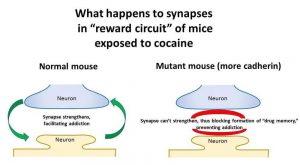Drug addiction in our society has long been associated with a lack of willpower. I am here to tell you that there is more to the story. There is an abundance of research detailing the plausibility of genetic predisposition to addiction in humans.

Photo credit: Mycroyance on Flickr creative commons. Available: http://bit.ly/15umG2O
Under the supervision of Dr. Bamji, Dr. Andrea Globa and her colleagues conducted a research experiment to determine the effects of how a sticky glue-like protein called cadherin was able to reduce the effects of addiction – in mice. In this experiment, cocaine was administered to the mice when they entered a specific chamber during the experiment to evoke a potential addiction to the drug. Cocaine was chosen as there has been extensive work done in similar fields with the same drug. Cadherin is this sticky glue-like protein that is present at connections between cells in the brain called synapses. These synapses act as the gap between nerve cells that allow electrical impulses from the brain to pass through to the body. Dr. Globa was conducting her experiment to see how these proteins would affect the mice exposed to cocaine versus those that were not. The results of Dr. Globa’s experiment were unexpected. The results showed that mice with higher levels of this protein in their brain would not allow for the connections to strengthen. This meant that the “drug memory” could not be formed and was, therefore, preventing the addiction from developing.

Photo credit: UBC – The effects of cadherin on developing cocaine addictions in mice.
We conducted our own interview with Dr. Globa and discussed her research. We developed a podcast and video to accompany this blog post in hopes that it will help better explain the importance of this research. The podcast elicits the importance of Dr. Globa’s research and how humans may benefit from further research in this field.
The following video depicts how mice with increased protein levels are impartial to which chamber they visit because the protein has not allowed their brain to create an addiction to the administered cocaine.
https://www.youtube.com/watch?v=X1fi6Iwf4TU&feature=youtu.be
Although the results of the experiment are exciting and seemingly optimistic, Dr. Globa made sure to explain that it is still too early to determine what implications this will have on humans. Dr. Globa’s research was another step forward on the long road to developing an understanding genetic predisposition to addiction.
Author: Ryan Berg, Ellen Chen, Nic Wu, Celia Dossot










